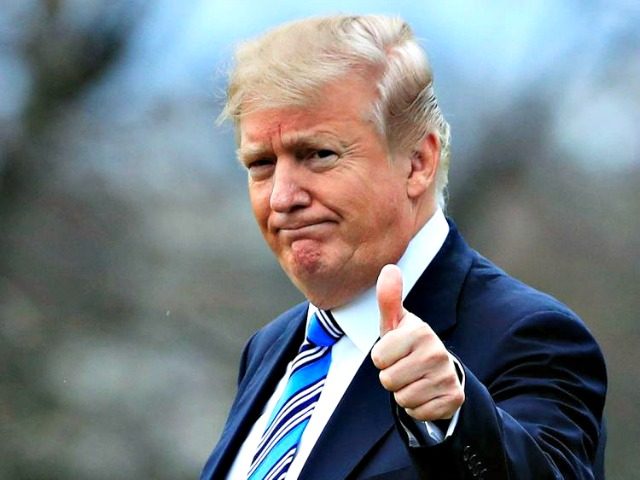The House Intelligence Committee voted on Thursday to approve their final report on Russian meddling in the 2016 presidential election and alleged collusion, sending it to the Intelligence community to be reviewed and declassified for release to the public.
The vote fell along party lines, with all Republicans on the committee voting to approve the report, and all Democrat members voting against. The report comes after 14 months of investigation.
Committee Chairman Devin Nunes (R-CA) said in a statement:
This report, based on 70-plus witness interviews and more than 300,000 documents collected, provides specific findings and recommendations to improve our election security before the mid-term elections. The report, which will include minority views if the minority submits them, presents the comprehensive results of what the Committee has learned during its fourteen-month-long investigation, and will be useful in thwarting any attempts by Russia or other foreign powers to further meddle in U.S. elections.
The committee also released a list of more than 40 findings from their investigation that shed more insight on the final report.
Most significant is the finding that “none of the interviewed witnesses” provided evidence of collusion, coordination, or conspiracy between the Trump campaign and the Russian government.
Notably, that includes Glenn Simpson — founder of Fusion GPS, who hired ex-spy Christopher Steele to work on what became the Trump dossier.
That also includes former CIA Director John Brennan, former Acting Attorney General Sally Yates, former Acting Attorney General Mary McCord, former Attorney General Loretta Lynch, former Assistant Attorney General for National Security John Carlin, former FBI Director James Comey, former Deputy FBI Director Andrew McCabe, former National Security Adviser Susan Rice, Deputy National Security Adviser Ben Rhodes, and former U.S. Ambassador to the United Nations Samantha Power.
It also included Clinton campaign chairman John Podesta, Clinton campaign adviser Jake Sullivan, and former Democratic National Committee Chairwoman Debbie Wasserman Shultz.
Another finding is that the committee found “no evidence that President Trump’s pre-campaign business dealings formed the basis for collusion during the campaign.”
The committee also found “no evidence that Trump associates were involved in the theft or publication of Clinton campaign-related emails, although Trump associates had numerous ill-advised contacts with WikiLeaks.”
The idea that the Trump campaign had worked with Russia to steal Democratic National Committee and Podesta emails formed the original basis of the collusion claim by the Clinton campaign.
The committee also addressed former Trump campaign associates’ contacts with Russians, which Democrats have alleged show collusion.
It found that former Trump campaign adviser Carter Page “did not travel to Moscow in July 2016 on behalf of the Trump campaign. However, it added, “the Committee is concerned about his seemingly incomplete accounts of his activity in Moscow.”
The committee also said former adviser George Papadopoulos’s “attempts to leverage his Russian contacts to facilitate meetings between the Trump campaign and Russians was unsuccessful.”
On the infamous June 2016 Trump Tower meeting, it said: “Donald Trump Jr., Jared Kushner, and Paul Manafort attended a June 9, 2016, meeting at Trump Tower where they expected to receive — but did not ultimately obtain — derogatory information on candidate Clinton from Russian sources.”
It added that Trump Jr. “briefly met” with a Russian government official at the 2016 National Rifle Association annual meeting, but that there was “no evidence” that the two discussed the U.S. presidential election.
The committee also cleared Attorney General Jeff Sessions, finding that: “The Committee found no evidence that meetings between Trump associates — including Jeff Sessions — and official representatives of the Russian government — including Ambassador Kislyak — reflected collusion, coordination, or conspiracy with the Russian government.”
The committee found that Steele’s second- and third-hand information, purportedly from high-placed Russian sources, was provided directly to Fusion GPS and Perkins Coie and “indirectly” back to the Clinton campaign.
The committee also issued new findings on intelligence community leaks that suggested that intelligence officials under the Obama administration leaked information to media.
It said leaks of classified information regarding Russian intentions to sow discord in the elections began before the election, and “increased dramatically” after the election.
In addition, it said leaks prior to the classified Intelligence Community Assessment’s publication, correlate to “specific language” found in the assessment.
The findings also appeared to corroborate a report by investigative journalist Sara Carter that former Director of National Intelligence James Clapper had leaked to CNN that President-Elect Trump had been briefed on the dossier — which set off a report by CNN and the subsequent publishing of the dossier by Buzzfeed.
“Former Director of National Intelligence James Clapper, now a CNN national security analyst, provided inconsistent testimony to the Committee about his contacts with the media, including CNN,” it said.
The committee also released a finding that could raise questions about Flynn’s guilty plea.
“General Flynn pleaded guilty to making a false statement to the Federal Bureau of Investigation regarding his December 2016 conversations with Ambassador Kislyak, even though the Federal Bureau of Investigation agents did not detect any deception during Flynn’s interview,” it said.
The committee also issued a number of findings concluding that the Obama administration did not take sufficient steps to counteract Russian meddling before or after the election, and issued a number of recommendations on countering such interference.
For the intelligence community, it recommended it update its guidance regarding media contacts to “ensure the guidance applies to every employee, including senior officials.”
The committee recommended that Congress consider legislation on increasing penalties for leaks of classified information, and that the Executive Branch consider making all non-Senate-confirmed political appointees who have top secret clearances take mandatory polygraphs.

COMMENTS
Please let us know if you're having issues with commenting.